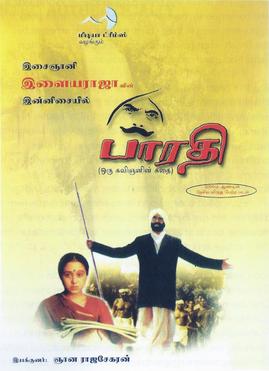Bharati or Bharathi may refer to:
Bharati or Bharathi may refer to:

Kannada, previously also known as Canarese, is a Dravidian language spoken predominantly by the people of Karnataka in southwestern India, with minorities in all neighbouring states. It has around 44 million native speakers, and is additionally a second or third language for around 15 million non-native speakers in Karnataka.
Nandini is a South Asian female given name. It is derived from the Sanskrit verbal root nand, which means "to rejoice, delight". Literally, nandinī means a woman who brings joy. The name also specifically refers to a daughter, as a daughter brings joy to the family. In the Hindu religion, Goddess Parvati is often addressed by this name. Nandini also refers to one of the eight eternal companions (Ashtanayika) of Goddess Parvati.
Kavi or KAVI may refer to:
Vishwanath is an Indian surname and given name. It is of Hindu origin and derives from višvanatha, meaning "lord of the universe", including the Tamil-Malayalam third-person masculine singular suffix -n, -m. It may refer to:

C. Subramania Bharati was a Tamil writer, poet, journalist, Indian independence activist, social reformer and polyglot. He was bestowed the title "Bharati" for his excellence in poetry. He was a pioneer of modern Tamil poetry and is considered one of the greatest Tamil literary figures of all time. He is popularly known by his mononymous title "Bharati/ Bharathiyaar," and also by the other title "Mahakavi Bharati". His numerous works included fiery songs kindling patriotism during the Indian Independence movement. He fought for the emancipation of women, against child marriage, vehemently opposed the caste system, and stood for reforming society and religion. He was also in solidarity with Dalits.
The word Mahakavi or Maha Kavi is an Indian honorific which means "Great Poet" in Sanskrit. This may refer to:
Deva may refer to:
Krishna is a Hindu deity.
Kalyani may refer to:
Satya is a Sanskrit Concept in Indian religions that loosely translates into English as "Truth".
Karthik or Kartik may refer to:
Chitra may refer to:

Pandari Bai was an Indian actress who worked in South Indian cinema, mostly in Kannada cinema during the 1950s, 1960s and 1970s. She is considered Kannada cinema's first successful heroine. She has acted as both heroine and mother to stalwarts such as Rajkumar, M. G. Ramachandran, Sivaji Ganesan. She was the heroine in Rajkumar's debut movie Bedara Kannappa and also Sivaji's debut movie Parasakthi. She has acted in over 1,000 films in Kannada, Tamil, Telugu and Hindi. Bai was honoured by Kalaimamani from the Tamil Nadu government.
Vishnuvardhan may refer to:
Ramakrishna (1836–1886) or Sri Ramakrishna Paramahamsa was an Indian Hindu religious teacher.
Annapurna is a massif in the Himalayas, in north-central Nepal.

Bharathi is a 2000 Indian Tamil-language biographical film based on the life of Subramania Bharati starring Sayaji Shinde, Devayani and Nizhalgal Ravi. The film was directed by Gnana Rajasekaran and won the National Film Award for Best Feature Film in Tamil for the year 2000.
Mohini is the only female avatar of the Hindu god Vishnu and goddess Parvati.
Barati may refer to:

Bharati braille, or Bharatiya Braille, is a largely unified braille script for writing the languages of India. When India gained independence, eleven braille scripts were in use, in different parts of the country and for different languages. By 1951, a single national standard had been settled on, Bharati braille, which has since been adopted by Sri Lanka, Nepal, and Bangladesh. There are slight differences in the orthographies for Nepali in India and Nepal, and for Tamil in India and Sri Lanka. There are significant differences in Bengali Braille between India and Bangladesh, with several letters differing. Pakistan has not adopted Bharati braille, so the Urdu Braille of Pakistan is an entirely different alphabet than the Urdu Braille of India, with their commonalities largely due to their common inheritance from English or International Braille. Sinhala Braille largely conforms to other Bharati, but differs significantly toward the end of the alphabet, and is covered in its own article.